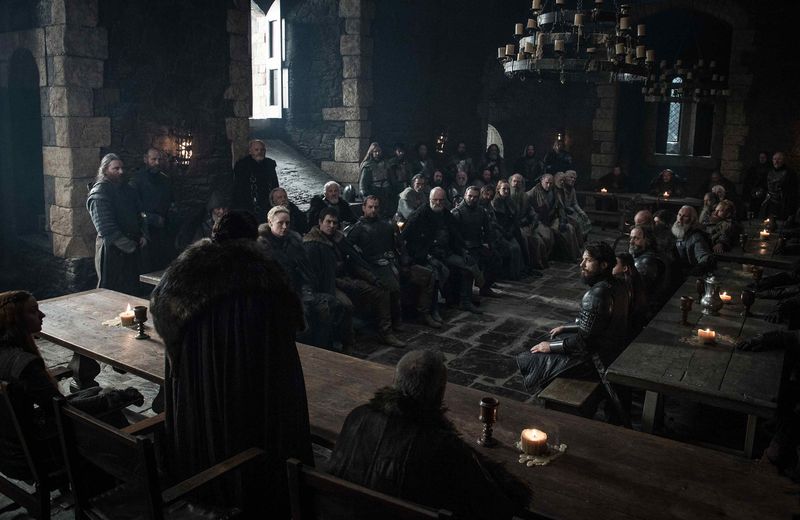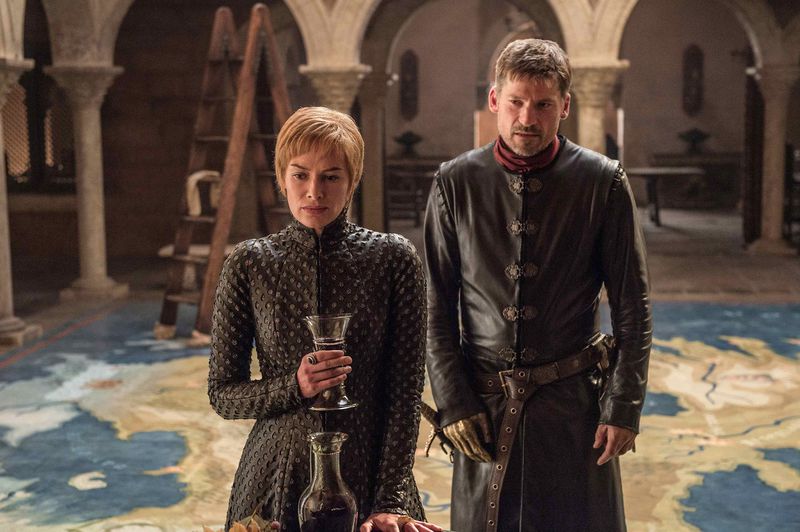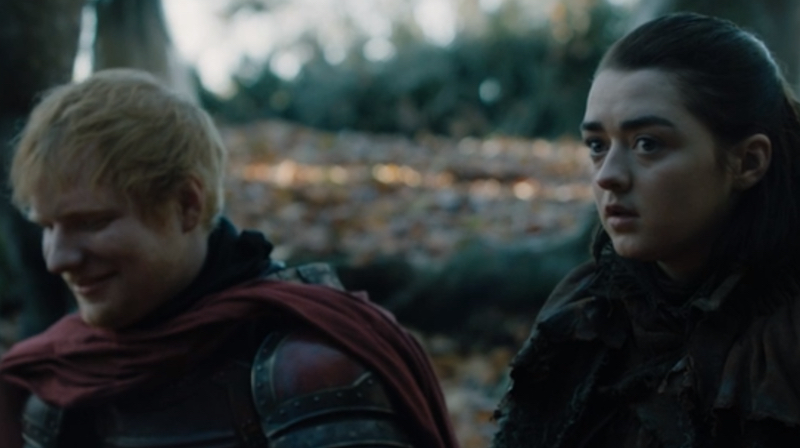NOTE: This post was originally written during Season Seven of Game of Thrones. Unfortunately, some of its storytelling lessons were ignored during the questionable writing choices of Season Eight.
The first episode of any show’s new season acts as a “reset button” for longtime audience expectations as well as a jumping-on point for new viewers. In the case of Game of Thrones, whose Season Seven debut had the highest reported viewership of the entire series, that’s a lot of new (and potentially confused) viewers to educate and hook at the same time.
With over a year having passed since Season Six ended, the first episode of Season Seven had to fulfill four functional purposes:
- reintroduce the main characters
- remind us where everyone is located geographically in Westeros
- clarify what each character wants to obtain (and what stands between them and their goals)
- set the stage for the conflicts that will drive the series’ final 12 episodes
As a result, this episode is heavy on exposition and light on action. But it also demonstrates the skill of showrunners David Benioff and D. B. Weiss, who structured each scene to deliver all the necessary information we need to know (or remember) while also building toward conflict-laden questions that reveal their characters’ most dominant traits, all in service of the show’s core themes.
Here are three ways the scenes in this episode achieve the goal of merging plot, character, and theme into a unified narrative.
(WARNING: Spoilers ahead!)
Theme 1: Succession
As an epic tale that spans generations, Game of Thrones wrestles with one central question more than any other: do we have the freedom to change our circumstances, or does every generation inevitably fight the same battles as its predecessors?
Each scene in this episode approaches this theme from a slightly different angle, but they all add up to an overarching point of view: yes, we do have the opportunity to change our fate… but do we have the will, the grace, or the dedication to do so?
The most obvious example of this theme is threaded through the strategy session at Winterfell.
Creating Conflict through Opposing Motivations
While planning their defense of the North against the undead army that’s approaching, Jon Snow and Sansa Stark have differing opinions on whether the allies who turned against them should be stripped of their families’ titles and land or given a chance to atone for their disloyalty.
Jon — the idealist who’s focused on the big picture and the long-term impact of their actions — believes the traitors’ heirs should be given their own chance to prove their loyalty; Sansa — the pragmatist who’s focused on immediate threats — believes they should be punished as a deterrent against other potential defectors. As the newly-announced king of the North, Jon’s decision stands despite Sansa publicly doubting his wisdom.
This action underscores Jon’s key strength (honor) and flaw (naïveté), both of which he learned from his main influences (Ned, Mance, Stannis), while framing his own idealism in opposition to Sansa’s defining characteristics of survivalism and control, which she learned from her own darker influences (Cersei, Littlefinger, Ramsay).
Theme 2: Knowledge Is Power
Aside from Daenerys’s narratively straightforward return to Dragonstone, every scene in this episode falls into one of two camps: either one character knows more than the other characters in a scene do (which shifts the balance of power), or none of the characters know anything until something relevant is revealed through character-driven action.
Examples of the former include:
- Arya leading the entire Frey clan to their demise by impersonating Walder Frey and inviting them to share a toast that only Arya herself knows is poisoned
- Bran convincing the head of the Night’s Watch that he’s Ned Stark’s son by telling him things that only a Stark son would know, turning a potential refusal of shelter into an obligation to help
Examples of the latter include:
- The Hound overcoming his skepticism and his fear of fire in order to receive visions fo the future
- Sam’s dogged resourcefulness leading him to break the Citadel’s rules and steal the forbidden books that house the secret knowledge required to defeat the White Walkers
But the best example of these tactics working in unison occurs in the three scenes between Cersei and Jaime Lannister.
Establishing the Knowledge Gap
First, Queen Cersei and her twin / lover Jaime debate the validity of their empire while literally standing on a map of it. Jaime is convinced that their position is weak, and he mocks Cersei’s lofty ambition to “create a dynasty” given their current absence of allies and money… until Cersei ends the scene by asking if Jaime believes she listened to their father’s wisdom for 40 years without learning anything at all.
In just one sentence, Cersei reveals that she’s strategizing several moves ahead of Jaime — and, by extension, confirming that while he may be the male heir to their family name, she’s the one who inherited their father’s cunning.
Raising the Stakes
Next, Jaime (and the viewer) learns that Cersei has invited Euron Greyjoy to discuss an alliance. Jaime laments the Greyjoys’ shortcomings and fallibility as allies… but once again, Cersei gets in the last word: she reveals that she knows Euron has come here seeking a queen.
Two scenes in a row, we see how Cersei is always a step ahead of what everyone else is thinking. Plus, if Euron really does have designs on marrying Cersei, this creates a direct threat to Jaime — and Cersei just informed him of it with zero warning.
Twisting the Knife
Finally, when Euron makes his pitch to marry Cersei (after he and Jaime have traded barbs about their various flaws), she turns him down. Undaunted, Euron replies that he will return with a “priceless gift” that will prove the merits of his proposed union.
In defiance of the narrative rule of thirds, Cersei doesn’t even need to have the last word in this scene in order to get Euron to do her bidding; in fact, she accomplishes this without giving him anything at all.
These three scenes combine to prove why Cersei is the reigning queen of Westeros: unlike Jaime’s warped notions of honor, the survival-obsessed Cersei knows her allies and her enemies better than they know themselves, and that knowledge is power.
(It’s also worth mentioning that all three major armies on the board are led by duos who balance the “honor vs. survival” conceit: Jon + Sansa, Jaime + Cersei, and Dani + Tyrion.)
Theme 3: Action Is Belief
Jon governs with respect while Cersei rules with control, which are abstract illustrations of their core traits. But Arya and the Hound each have scenes that use action to tangibly reveal how much their own core beliefs have (or haven’t) changed.
Action as Proof of Change
When the Hound encounters the skeletons of a family he once robbed, which led to them killing themselves rather than starving to death, he’s faced with the ignoble results of his own actions. The Hound of earlier seasons wouldn’t have been moved by this sight, but lately the Hound has been questioning life, religion, and purpose. These dark fruits of his past actions have shaken him.
In the middle of the night, the Hound buries the family in a freshly-dug grave and attempts to say a prayer in their names. This shift in his actions visibly bends his arc toward redemption.
Action as Proof of Consistency
Meanwhile, after murdering the Freys, Arya comes upon a camp of Lannister soldiers [and Ed Sheeran] resting in the woods. While she (and we) may expect this scene to build inevitably toward violence, we’re surprised when the soldiers turn out to be decent men who invite her to join them as a guest.
Then, just as we’re allowing ourselves to let our narrative guard down, the lead solider asks Arya why she’s headed toward King’s Landing. Arya (after downing a quick drink to bolster her courage) tells them the truth: “I’m going to kill the queen.”
The soldiers stare at her, mouths open and dumbfounded… and then they burst out laughing, convinced that she must be joking. Arya laughs along with them, defusing the tension. But her bluntness confirms that while she may have learned the art of subterfuge to fuel her desire for revenge, she’s still a believer in truth and honesty at heart.
That these soldiers find Arya’s transparency so laughable is also illustrative of the show’s overarching conceit: when every day is a life-or-death struggle between control and freedom, the idea that anyone who plays the game of thrones would ever be honest must sound like the biggest lie of all.
If You Liked This Post, You May Enjoy…
What Game of Thrones and The Walking Dead Can Teach Us About Modern Storytelling
Steve Harrington, Jaime Lannister, and the Secret to Writing a Redemption Arc





0 Comments